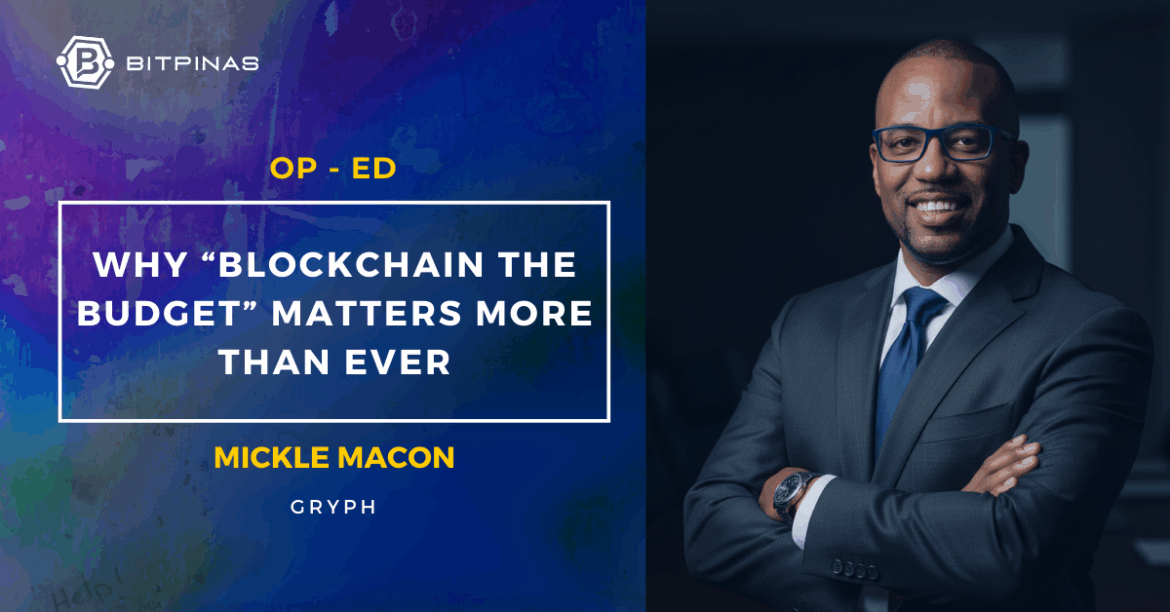Disclaimer: This article is for informational purposes only and does not constitute financial advice. BitPinas has no commercial relationship with any mentioned entity unless otherwise stated.
📬 Get the biggest crypto stories in the Philippines and Southeast Asia every week — subscribe to the BitPinas Newsletter.
By Mickele Macon
Ann Cuisia recently argued that laws should not mandate a specific technology like blockchain, but instead remain timeless and principle-based; focused on transparency, accountability, and fairness. On paper, this is sound advice. Laws should indeed be future-proof and flexible.
But here’s the reality: the Philippines already has laws that promote transparency and accountability; from the Government Procurement Reform Act (RA 9184) to the Anti-Graft and Corrupt Practices Act (RA 3019), and even the Freedom of Information EO. Yet scandals keep repeating. The recent flood control controversy is only the latest reminder that the gap isn’t in legal principles, it’s in enforcement and trust.
That’s where blockchain comes in.
Why Blockchain Is Being Demanded
Calls to “blockchain the budget” are not about worshipping a single technology or locking it into law. They are about ensuring that the public has access to a verifiable, immutable ledger of government spending.
Unlike traditional records, which can be falsified or quietly altered, blockchain offers:
- Transparency in real-time: Anyone can see where funds go, as they go.
- Immutable records: Once logged, transactions cannot be erased or “adjusted.”
- Public verification: Watchdogs, media, and ordinary citizens can audit without relying on gatekeepers.
This is not just a theoretical promise. It directly addresses the exact problems that enabled ghost projects, inflated contracts, and false claims in scandals like flood control. The clamor to “blockchain the budget” is not about hype, it is about preventing the next cycle of corruption.
Why Neutral Principles Alone Aren’t Enough
Ann is right: laws should focus on principles and outcomes. But for decades, we’ve had those principles written into law. They didn’t stop corruption because the systems used to enforce them were weak or easily manipulated.
Blockchain is the first tool that offers a level of enforcement by design, where manipulation becomes significantly harder, if not impossible.
If we keep insisting on timeless legal language without adapting to the technological tools available today, we risk repeating the same mistakes of the past. Citizens aren’t asking lawmakers to fetishize blockchain. They’re demanding a system that finally works.
The Balanced Approach
A reasonable middle ground exists:
- Write laws that enshrine transparency, verifiability, and accountability as non-negotiable outcomes.
- Recognize blockchain as a currently viable mechanism to achieve those goals, while leaving space for future technologies to replace it if they can deliver equal or greater trust.
This way, we respect the principle of technological neutrality while also addressing the urgency of today’s governance crisis.
Conclusion
To dismiss “blockchaining the budget” as missing the point is, ironically, to miss the point itself. Citizens are not chasing a fad; they are demanding a system where corruption has fewer places to hide.
If blockchain can help deliver that today, then it deserves to be part of the solution, not as a political ornament, but as a tool to rebuild trust in government.
About the Author
Mickele Macon is the Founder & CEO of GRYPH, a Web3 ecosystem launched in 2021 that builds blockchain-powered solutions for transparency, community, and commerce. He has been active in the blockchain space since 2017, with a professional background in cybersecurity and experience in finance, digital identity, and decentralized applications. Mickele previously contributed to the FinTech Philippines Association (FinTech PH) and the Philippine Association of Digital Commerce & Intelligence (PADACI), where he engaged in advancing fintech and digital policy discussions.
He was also a contestant on The Final Pitch Season 8: The Tech Edition, and is a recent graduate of the Alibaba Netpreneur Masterclass 2025, where he collaborated with global founders on applying blockchain and AI to real-world challenges. With over eight years of blockchain involvement and startup leadership, he advocates for practical, citizen-focused solutions to corruption and governance issues in the Philippines.
This article is published on BitPinas: [Op-Ed] Mickele Macon of Gryph: Why “Blockchain the Budget” Matters More Than Ever
What else is happening in Crypto Philippines and beyond?

